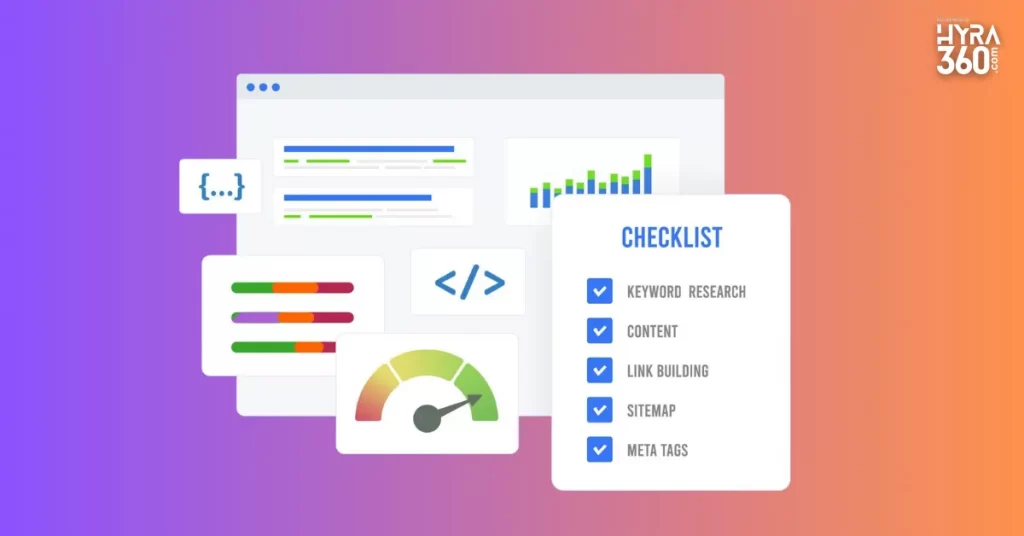In today’s competitive real estate market, having a well-designed and search engine optimized website is crucial for attracting potential clients and standing out. This comprehensive guide will provide valuable insights and tips for creating an SEO-friendly real estate website that ranks well and drives conversions.
On this page
Importance of SEO-Friendly Real Estate Website Design
In a crowded digital marketplace, the power of search engine optimization (SEO) cannot be overstated. By strategically optimizing your real estate website, you can improve your rankings in search engine results, attract more targeted traffic, and ultimately drive growth and revenue. Writing SEO-friendly blog posts involves careful target keyword selection, strategic placement of these keywords, and creating high-quality, relevant content that search engines deem valuable. This increases the likelihood of attracting and retaining your target audience.
Start with an SEO Audit
Before diving into the specifics of real estate website design, it’s essential to conduct a thorough SEO audit. This involves evaluating various aspects such as site structure, page structure, content, links, and usability. Key elements to consider during the audit include:
- Site Structure: XML sitemap, robots.txt, and redirects.
- Page Structure: Titles, meta descriptions, heading tags, alt tags, and URLs.
- Content: Structure, keyword and link placement, visual elements, duplicates, redirects, and canonical tags.
- Links: Outbound and inbound links, interlinking, and broken links.
- Usability: Accessibility, mobile-friendliness, and site speed optimization.

Keyword Research and Analysis
Selecting the right keywords is fundamental for real estate website design. Understanding the target audience and identifying relevant long-tail keywords can significantly impact search engine rankings. Tools like Google Keyword Planner can aid in comprehensive keyword research and analysis, ensuring that the website’s content aligns with the search intent of potential clients.
SEO-Friendly URLs and Headings
The significance of URL structure and headings in SEO cannot be overstated. Crafting search engine-friendly URLs and headings, along with effective use of title tags to target specific keywords, plays a pivotal role in enhancing the website’s visibility and ranking on search engine results pages (SERPs).
Content Optimization
Creating high-quality, relevant content that is optimized for search engines is crucial for real estate websites. This involves strategic placement of keywords, image optimization, proper outbound and internal link placement, and optimizing for click-through rate (CTR) and bounce rate.

Mobile Responsiveness and Website Performance
With the increasing use of mobile devices for browsing, ensuring that a real estate website is mobile-responsive and optimized for performance is imperative. Factors such as responsive design, page speed, and mobile-friendly features contribute to a seamless user experience across various devices.
Local SEO and Google My Business
For real estate businesses targeting local clients, leveraging local SEO strategies and listing the business on platforms like Google My Business and other relevant directories can significantly enhance visibility in local search results.
Social Media and Content Marketing
Utilizing social media platforms to promote the real estate business, publishing informative blog posts, creating visual content, and engaging with the audience can drive traffic to the website and establish authority and trust within the industry.
User Experience and Conversion Optimization
Enhancing user experience through effective call-to-action buttons, featured listings, providing assistance, and alerts, contributes to improved engagement and conversion rates on the real estate website.
Conclusion
n conclusion, implementing these SEO-friendly real estate website design tips can lead to improved search engine rankings, increased website traffic, and ultimately, greater business success. By focusing on SEO best practices and user-centric design, real estate professionals can create a compelling online presence that resonates with their target audience.By incorporating the insights and strategies outlined in this comprehensive guide, real estate businesses can elevate their online presence and drive growth and revenue through a well-designed and search engine optimized website.For further insights and guidance on real estate website design, feel free to reach out to our team of experts.This comprehensive guide provides a structured overview of key points for creating an SEO-friendly real estate website. By following these tips, real estate professionals can enhance their online presence and attract more potential clients.
Citations
1. coming soon



























